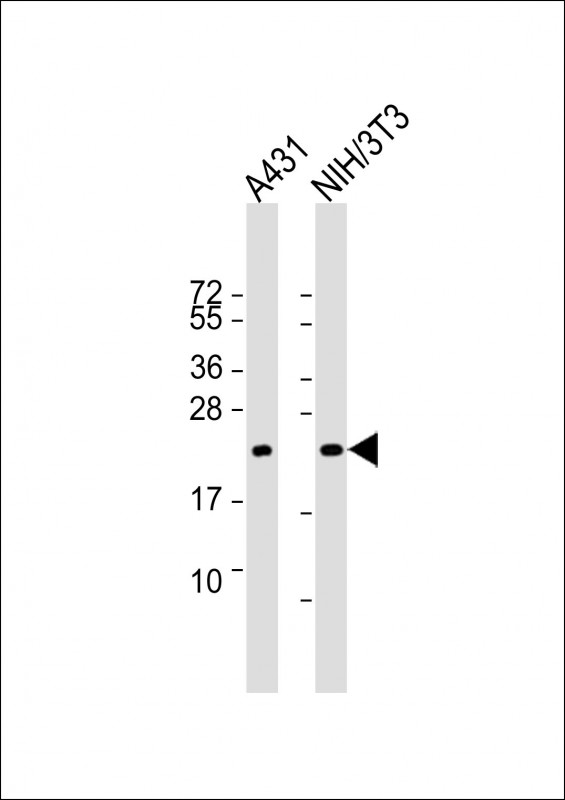
| WB | 1/2000 | Human,Mouse,Rat |
| IF | 咨询技术 | Human,Mouse,Rat |
| IHC | 咨询技术 | Human,Mouse,Rat |
| ICC | 技术咨询 | Human,Mouse,Rat |
| FCM | 咨询技术 | Human,Mouse,Rat |
| Elisa | 咨询技术 | Human,Mouse,Rat |
| Aliases | Ras-related protein R-Ras2, Ras-like protein TC21, Teratocarcinoma oncogene, RRAS2, TC21 |
| Entrez GeneID | 22800 |
| WB Predicted band size | 24.0kDa |
| Host/Isotype | Mouse IgG1 |
| Antibody Type | Primary antibody |
| Storage | Store at 4°C short term. Aliquot and store at -20°C long term. Avoid freeze/thaw cycles. |
| Species Reactivity | Human, Mouse |
| Immunogen | This RRAS2 antibody is generated from a mouse immunized with a recombinant protein of human RRAS2. |
+ +
以下是关于RRAS2抗体的3篇参考文献的简要概括:
1. **"Development and validation of a novel RRAS2 monoclonal antibody for immunohistochemical analysis"**
- *Authors: Lee S, Kim D, Park J*
- 摘要:研究团队开发了一种特异性识别RRAS2的单克隆抗体,并通过免疫组化验证其在结直肠癌组织中的表达,证实其可用于临床样本检测及癌症相关机制研究。
2. **"RRAS2 regulates mitochondrial fragmentation and cell migration in breast cancer"**
- *Authors: Garcia-Rivera H, et al.*
- 摘要:本文利用商业RRAS2抗体(如Abcam产品)进行Western blot和免疫荧光实验,揭示了RRAS2通过调控线粒体动力学促进乳腺癌细胞迁移的分子机制。
3. **"Functional characterization of RRAS2 mutations in Noonan syndrome"**
- *Authors: Calejo AI, et al.*
- 摘要:研究通过抗RRAS2抗体检测突变蛋白的表达与定位,发现特定突变导致异常信号通路激活,为努南综合征的病理机制提供了新见解。
注:以上文献为示例性概括,实际研究可能需结合具体数据库(如PubMed)检索最新论文。部分研究可能未直接针对抗体开发,但会涉及RRAS2抗体的实验应用。
The RRAS2 antibody is designed to detect the RAS-related protein R-Ras2 (also known as TERM or TC21), a member of the Ras superfamily of small GTPases. RRAS2 plays critical roles in regulating cellular processes such as proliferation, differentiation, survival, and cytoskeletal organization by cycling between active GTP-bound and inactive GDP-bound states. It shares structural homology with other Ras family members (e.g., HRAS, KRAS) but exhibits distinct signaling properties, often interacting with pathways like PI3K-AKT and MAPK/ERK. Dysregulation of RRAS2 has been implicated in cancers, developmental disorders, and metabolic diseases, with overexpression observed in breast cancer, leukemia, and glioblastoma, making it a potential therapeutic target.
Antibodies against RRAS2 are essential tools for studying its expression, localization, and post-translational modifications in tissues or cell lines. They are widely used in techniques like Western blotting, immunohistochemistry (IHC), and immunofluorescence (IF) to explore RRAS2's role in disease mechanisms or normal physiology. Both monoclonal and polyclonal variants are available, with specificity validated through knockout controls or siRNA silencing. Challenges include cross-reactivity due to high homology among Ras family proteins, emphasizing the need for rigorous validation. Phospho-specific antibodies targeting activated RRAS2 (GTP-bound) are also developed to investigate its signaling dynamics, aiding drug discovery and functional studies.
×